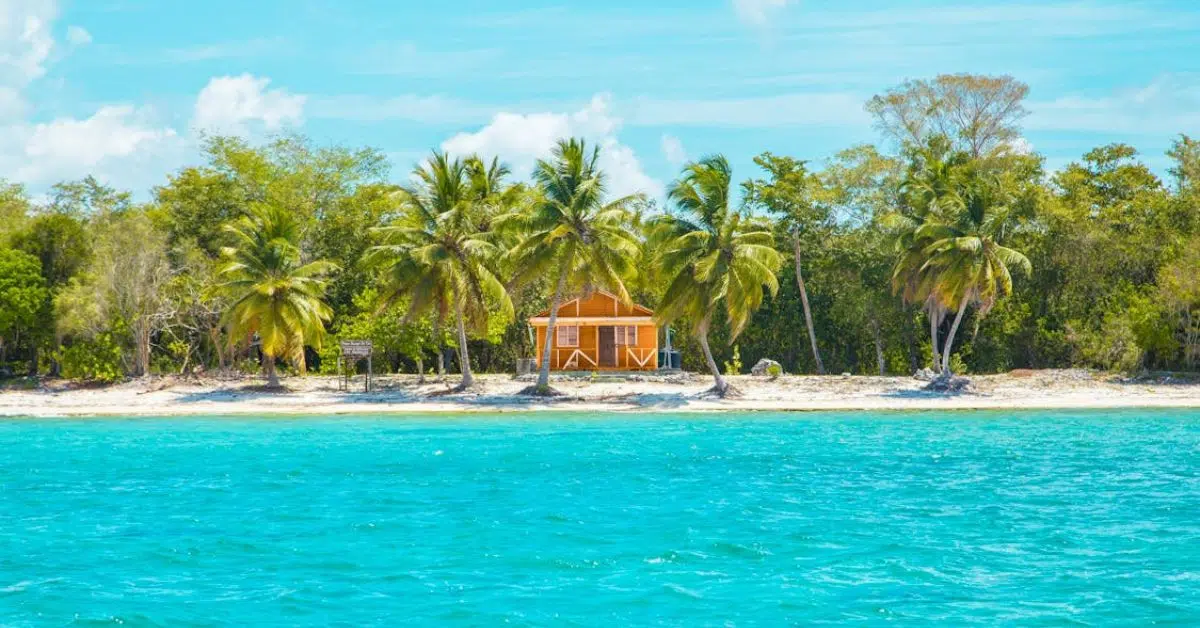Want a cheap vacation in the Caribbean? Safe and beautiful islands are perfect for relaxing, retiring, or working from. We’ll help you find the right one for your dream trip.
1. Introduction (The Dream of Affordable Caribbean Living)
The Caribbean is a beautiful place to live with amazing beaches, fun things to do, and warm weather all year round. But some islands can be expensive and unsafe.
The good news is that there are safe and affordable islands too! This guide will tell you about the cheapest and safest islands to live on. We’ll look at how much it costs to live there, how safe they are, and what life is like on each island.
Whether you want a peaceful place to relax, a good place to raise your family that won’t break the bank, or an exciting adventure, we can help you find the perfect island for you in the Caribbean.
2. Defining Affordable and Safe in the Caribbean Context

Before discussing specific islands, let’s discuss what affordable and safe mean in the Caribbean.
The cost of living on different islands is different. Some islands, especially those with many tourists, can be as expensive as living in North America or Europe. But other islands are much cheaper, especially for housing, food, and fun. You should consider how much money you have and how you want to live when you decide what’s affordable.
Safety is also different on different islands. The Caribbean has some problems, but many islands are very safe. They have little crime, good hospitals, and well-maintained roads and bridges. It’s important to find out about the crime, hospitals, and how prepared each island is for natural disasters before you choose one.
We’ll discuss the cost of living and safety on some of the best Caribbean islands. This will help you find the balance between affordability and safety for your dream island life.
3. Top 5 Cheapest and Safest Caribbean Islands to Live
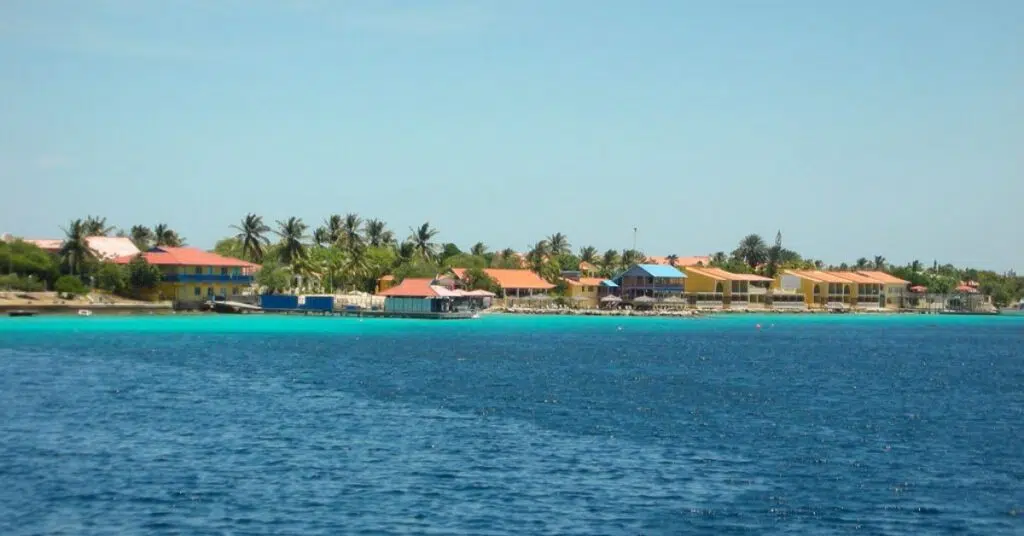
Here are some of the best Caribbean islands that are both affordable and safe to live on:
- Dominica: This island is called the “Nature Isle” because it’s so beautiful and green. It has affordable places to live and very little crime. Dominica is a great choice if you love nature and want a peaceful life.
- Ambergris Caye, Belize: This island has a friendly mix of people from all over the world, including people born there. You can find many places to live here, from cheap to expensive. It’s safe and has good roads and stores.
- Roatan, Honduras: This island has grown a lot lately and is always getting better. It’s known for its beautiful coral reefs and diving. If you like an exciting life, you can find affordable houses here.
- Las Terrenes, Dominican Republic: This island has nice beaches, and more and more people are moving here from other countries. Some parts of the island are for tourists, but you can find cheaper places to live away from those areas.
- Isla Colon, Panama (Bocas del Toro): This group of islands is very relaxed and getting better all the time. The houses are affordable, and the island is focused on protecting nature. People who love nature and people from other countries are starting to move here.
We’ll tell you more about each island so you can choose the best one.
4. Cost of Living Breakdown in the Caribbean

To make an informed decision about where to live, let’s break down the cost of living in the Caribbean islands we’ve highlighted.
Remember, these are just estimates, and your expenses can vary depending on your lifestyle choices and personal needs.
- Dominica: You can live comfortably on about $1,500-$2,000 per month. Rent for a one-bedroom apartment might be around $500, while local groceries are relatively inexpensive.
- Ambergris Caye, Belize: Expect to spend $2,000-$3,000 monthly, depending on your housing choices and whether you eat out often. Imported goods can be pricier here.
- Roatan, Honduras: This island offers a more budget-friendly option, with monthly expenses averaging around $1,200-$1,800.
- Las Terrenas, Dominican Republic: You can comfortably live for $1,500-$2,500 per month. Prices can vary depending on your proximity to the beach and tourist areas.
- Isla Colon, Panama (Bocas del Toro): A budget of $1,300-$2,000 monthly is a good starting point. Housing costs can vary, and imported goods may cost more.
Keep in mind that these are just guesses. What you spend could differ depending on how you live, what kind of place you choose to live in, and what you like spending money on.
5. Safety Factors in the Caribbean

If you’re thinking about moving to the Caribbean, safety is important to think about. Here’s a quick look at some safe places to consider:
- Dominica: It’s one of the safest islands in the Caribbean. People there look out for each other, and crime rates are low. But they do have to deal with hurricanes sometimes.
- Ambergris Caye, Belize: It’s safer than mainland Belize, even though there can be small crimes in tourist spots. The people are good at handling emergencies and have good healthcare.
- Roatan, Honduras: Honduras has some crime issues, but Roatan is safer than the mainland. Still, it’s smart to be careful and consider your surroundings.
- Las Terrenas, Dominican Republic: It’s safer than some big cities in the Dominican Republic, but it’s still good to be careful.
- Isla Colon, Panama (Bocas del Toro): This place is usually chill and safe, but watch out for small thefts. Many expats feel comfortable living there.
Remember, no place is risk-free. Do your research and talk to people who know the area before making a decision.
6. Residency and Visa Considerations

If you’re considering living in the Caribbean for a long time, it’s important to understand the rules for staying there. Each island has its own rules, so do your research carefully.
- Dominica: You have different options to become a resident, like investing money. You’ll need to show you have enough money and no criminal history.
- Ambergris Caye, Belize: After a year, you can apply to live there forever. You’ll need paperwork like a police check and a health check-up.
- Roatan, Honduras: They have visas for different reasons, like retirement or investing. Each type has its own rules and application.
- Las Terrenas, Dominican Republic: There are also different options, but it’s a good idea to talk to an immigration lawyer for help.
- Isla Colon, Panama: It’s easier for people from certain countries to live there permanently. They have a special visa called the Friendly Nations Visa.
Remember, the rules for living in these places can change, so always check the latest information from official government websites or talk to an expert.
7. Healthcare in the Caribbean
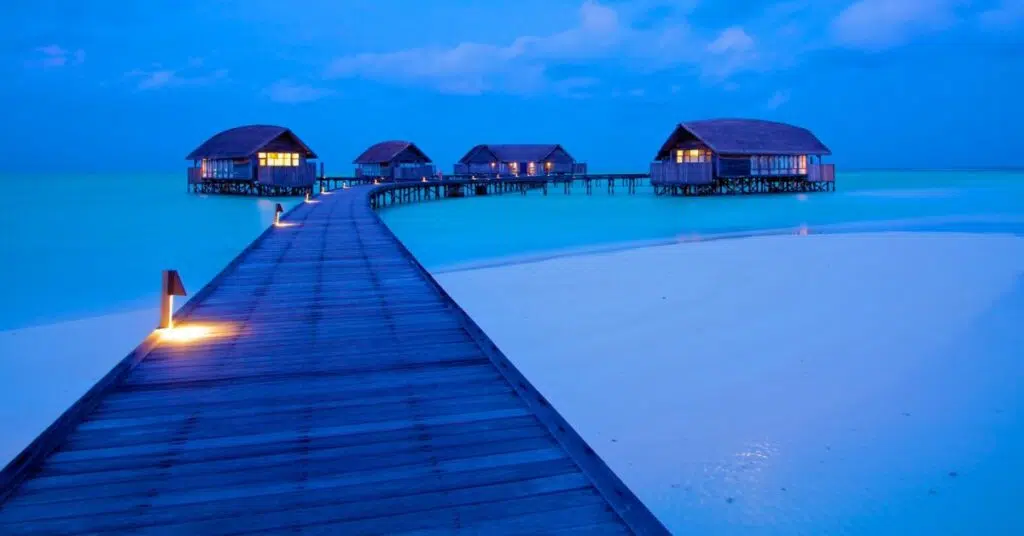
If you’re moving to the Caribbean, it’s important to consider what kind of healthcare you’ll have. Here’s what it’s like in some of the best islands:
- Dominica: There are public hospitals and clinics, but many people who move there choose to get private insurance. That’s because they prefer to see doctors who speak English. Private healthcare is good, but it can be expensive.
- Ambergris Caye, Belize: There is both public and private healthcare. Residents can use the public system, but people from other countries often choose private facilities for better care and shorter wait times.
- Roatan, Honduras: Healthcare is improving, with new places opening up. But, most people recommend getting private health insurance because the quality of care at public places isn’t always the same.
- Las Terrenas, Dominican Republic: Public and private hospitals and clinics are also here. People who move there usually prefer private options because they’re better quality and the staff speaks English. Getting international health insurance to help pay for big medical bills is a good idea.
- Isla Colon, Panama: There aren’t as many healthcare options here as in bigger cities in Panama. People who move there often go to private clinics or travel to Panama City for more specialized care.
Do your research to find out what kind of healthcare is available where you want to move. Also, remember to look into insurance options so you’re covered if you need it.
8. Finding Work and Making a Living

Thinking about working in the Caribbean? Here’s what you need to know:
- Dominica: Most jobs are in tourism, farming, and building. Some people find work teaching English or starting small businesses for tourists.
- Ambergris Caye, Belize: The biggest industry is tourism, with jobs in hotels, real estate, and other similar areas. Some people also work online from there.
- Roatan, Honduras: Tourism is also big here, with jobs in hotels, restaurants, and diving. There are also jobs in real estate and construction.
- Las Terrenas, Dominican Republic: Tourism is important, but there are also jobs in real estate, managing properties, and other services.
- Isla Colon, Panama: Most jobs are in tourism and hospitality, with some in construction and real estate. More and more people are working online here, too.
Important: You’ll usually need a work permit to work in these places. Make sure you check the rules before you move.
9. Pros and Cons of Caribbean Island Life
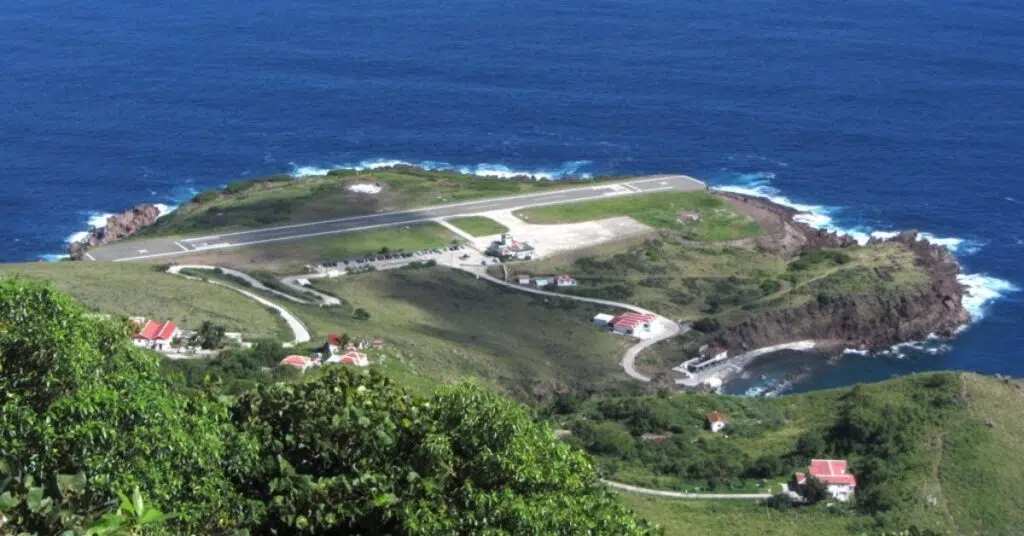
Living on a Caribbean island might sound like paradise, but being realistic about the pros and cons is important.
Pros:
- Natural Beauty: The Caribbean is really pretty. It has amazing beaches, green rainforests, and colorful coral reefs.
- Slower Pace of Life: Island life often encourages a more relaxed and less stressful lifestyle.
- Warm Weather: Say goodbye to harsh winters and enjoy year-round sunshine.
- Community: Expat communities are often close-knit and supportive.
- Cultural Experiences: Immerse yourself in diverse cultures, music, cuisine, and festivals.
Cons:
- Island Fever: Feeling isolated or bored can be challenging, especially on smaller islands.
- Limited Job Market: Finding work may be difficult, and wages may be lower than you’re used to.
- Cost of Imported Goods: Many goods are imported, which can drive up prices.
- Infrastructure: Some islands may have less developed infrastructure compared to larger countries.
- Natural Disasters: Hurricanes and other natural events are a potential risk.
Think carefully about the pros and cons of living on an island. This will help you choose if it’s the right choice for you.
10. Choosing the Right Island for You
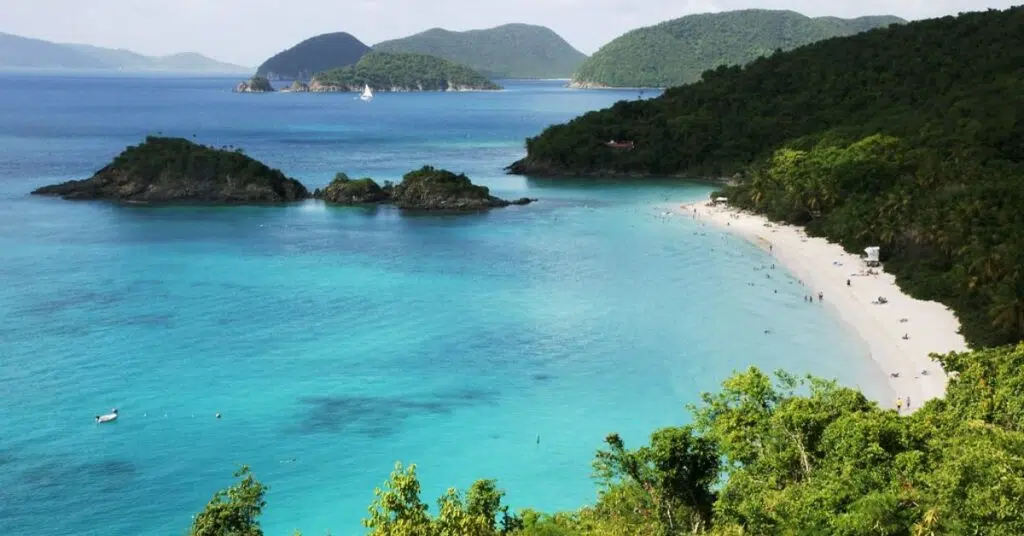
Choosing the perfect Caribbean island to call home is a personal journey. It’s about finding the place that fits how you want to live, what you can afford, and what’s most important to you. Consider these factors when making your decision:
- Lifestyle: Do you crave a bustling social scene or seek a more tranquil, nature-focused environment? Consider the pace of life and activities available on each island.
- Budget: Be realistic about your financial situation. Factor in housing costs, everyday expenses, and potential income sources.
- Safety: Prioritize your well-being. Research crime rates and safety measures on each island.
- Healthcare: Evaluate the available healthcare options and insurance requirements to ensure you can access quality care when needed.
- Community: Do you want a large expat community, or would you prefer to immerse yourself in local culture?
- Job Opportunities: If you plan to work, research the local job market and potential income sources.
- Visa and Residency: Understand the requirements and processes for obtaining residency.
- Infrastructure: Consider the island’s infrastructure, including transportation, utilities, and internet access.
- Climate: Are you comfortable with hot and humid weather year-round? Do you like weather that’s not too hot and not too cold?
- Activities: How do you spend your free time? Does the island offer your preferred activities and hobbies?
Take the time to research, talk to locals and expats, and ideally, visit the islands you’re most interested in. This will help you get a feel for the atmosphere and chooseif it suits you.
11. Tips for Making the Move

Moving to a Caribbean island is exciting but requires careful planning and preparation. Here are some tips to smooth your transition:
- Research: Thoroughly research your chosen island. Look into housing options, shipping costs, healthcare providers, and local resources. Connect with online expat communities for firsthand insights.
- Visit Before Moving: Visit the island before moving permanently. This will help you understand daily life’s lifestyle, culture, and practicalities.
- Shipping and Logistics: Plan to ship your belongings well in advance. Research reputable shipping companies and factor in potential delays.
- Housing: Start your housing search online or through local real estate agents. Initially, consider short-term rentals while you get settled.
- Legal and Financial Matters: Understand the visa and residency requirements, open a local bank account, and ensure you have access to your finances.
- Healthcare and Insurance: Research healthcare providers and insurance options on the island. Consider getting international health insurance for comprehensive coverage.
- Connect with Locals: Make an effort to meet locals and other expats. They can offer valuable advice and support during your transition.
- Be Patient: Adjusting to a new culture and way of life takes time. Be patient with yourself and assume the learning process.
Planning and taking these practical steps can make your move to a Caribbean island a smooth and enjoyable experience.
Conclusion
Dreaming of a safe and affordable life in the Caribbean? It’s possible! Each island is different, so think about costs, safety, healthcare, jobs, and how easy it is to live there. Whether you love nature, and culture, or just want to relax, there’s an island for you.
Before moving, research the islands, visit them if you can, and talk to the people there. With some planning, your dream of living in paradise can come true. So start your adventure today and discover the perfect Caribbean island for you!
FAQs
1. Which Caribbean island is the cheapest to live on?
It depends on how you live, but Dominica and Roatan in Honduras are usually very affordable for housing, food, and daily costs.
2. I want to be safe. Are there any Caribbean islands that are safe?
Yes! Dominica has very little crime and is known as a safe place. Ambergris Caye in Belize and Isla Colon in Panama are also usually safe places to live, but it’s always a good idea to be careful.
3. Can I work on these affordable islands? I don’t want just to retire there.
It depends on the island. Some, like Ambergris Caye, have a growing digital nomad scene, meaning remote work is possible. Others have more opportunities in tourism or real estate. It’s important to research the specific job market of the island you’re interested in.
4. Is healthcare good on these islands? What if I need a specialist or serious medical care?
Healthcare varies. Some islands have good private clinics, while others have more basic public healthcare. For serious conditions, you might need to travel to a larger island or the mainland. It’s wise to have health insurance that covers this.
5. Do I need a special visa to live on these islands?
Yes, each island has its own visa and residency requirements. Some are easier to get than others, especially if you’re retiring or have a steady income from abroad. It’s best to check the specific rules for the island you choose.
6. I’m on a tight budget. What are some ways to save money while living in the Caribbean?
Stick to local food and markets rather than imported goods. Find housing away from tourist areas. Take advantage of free activities like hiking or swimming. Be mindful of utility costs, as electricity can be expensive in some places.
7. What’s the downside of living on a Caribbean island? It sounds like paradise!
Island life can be isolating for some, and the job market is often limited. Some islands have a higher cost of living due to imported goods. Plus, hurricanes and other natural disasters are a potential risk.
8. How can I find out more about a specific island before I decide to move?
Do your research online, join expat forums, and try to visit the island if possible. Talking to locals and other expats can give you a much better sense of what daily life is really like.
